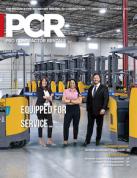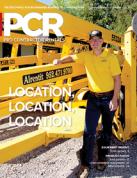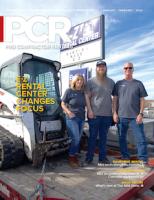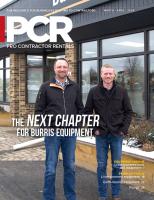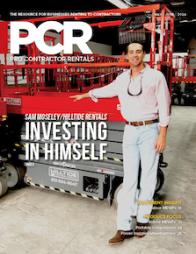Vertical Integration - High Rise Style
Keeps Chicago Contractor's Supply Growing
by Mike Martin
In a competitive world, the closer and more important you become to your best customers, while constantly working to earn new customers, the more solid your revenue footing. At CCS Chicago Contractor’s Supply, based in Naperville, Illinois, they’ve wrapped their business arms around an expanding customer base by leveraging knowledge, offering a diverse range of equipment, running a robust supply sales business, and touching “just about everything that has anything to do with concrete,” explains Steve Pakus, CCS rental manager.
And he means everything.
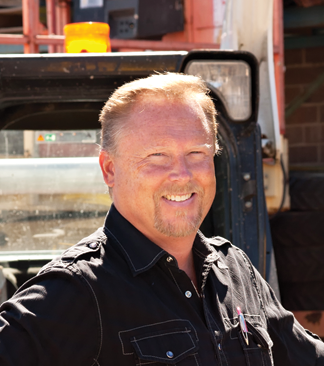 |
| Steve Pakus, Chicago Contractor's Supply |
The company has four divisions – rental, supply, concrete forming and manufacturing. CCS Chicago Contractor’s Supply handles contractor rentals and supply sales, including concrete form sales and rental, and rental of a self-rising hydraulic forming system for pouring elevator cores in high-rise buildings. CCS also operates out of Huntley and Bellwood, Illinois, and has a satellite facility in Pewaukee, Wisconsin. SureBuilT Manufacturing, the manufacturing arm of the business, is in Bellwood, and manufactures residential concrete ties, area wells and accessories, fabricates rebar, and manufactures and refurbishes forms.
Larry Harris, forming manager, works out of the Bellwood site and gets involved in all of the company’s concrete forming efforts, including the self-rising forming system. This unique product is a “high-tech, high-rental-value system for us,” Harris says. Setting it up requires extensive knowledge and effort from Harris’ group, but it’s not been sitting idle lately. “When it comes back in, we clean it up and it goes right back out,” he says.
“I think we’ve been involved in some way in just about every high-rise project in the downtown Chicago area,” Pakus adds. Harris nods in agreement: “We’re very strong in that market. Very strong.”
If it touches concrete . . .
The company, owned by Tom Fahey, had its foundation in manufacturing concrete forming materials and in contractor supply more than 30 years ago. CCS – Chicago Contractors’ Supply – was well-entrenched in the construction supply market, with more of a commercial focus. The owners purchased RJ Supply, strong in the commercial, rental as well as residential market, and merged the two, now generally referred to as CCS.
Their manufacturing business includes the Bellwood location, which also serves as a form rental and product distribution center, and another plant in Jasper, Tennessee that specializes in system scaffold. Historically, the company manufactured, sold, rented and refurbished forms, and manufactured and sold formliners, ties and other forming accessories. They have hot dip galvanizing and powder-coating processes for building and refurbishing metal scaffolding and shoring posts. More recently, though, windows, window bucks, area wells and grates and trash chutes were added to their line-up. The company also fabricates rebar to design specs for customers.
Considering the company’s full line-up, the “everything concrete” comment is fairly accurate and shows how the company has become vertically integrated. CCS will rent ground thawing equipment; rent equipment for small excavation jobs; rent equipment for compaction and site prep; rent or sell the forms for concrete construction; manufacture and sell any style of pins the contractor needs; sell mesh for concrete; sell rebar fabricated to the job’s specs; gang forms for a project (renting the forms and charging a fee for ganging to contractors’ specs); rent the self-rising system for a core; rent buggies for moving concrete around the job site; rent concrete vibrators, walk-behind and ride-on trowels; rent concrete-cutting equipment; sell concrete sealers; sell concrete stains (they make their own) and sell or rent stamps for decorative work; and
sell just about any other type of fastener, hand and power tool a contractor needs.
Their focus is virtually 100% contractors, with about 30% of revenue from equipment rental, 20% from form rentals and the rest in sales. They will get some homeowners in for walk-behind compaction equipment, concrete stain and stamps, and related “week-end warrior” project rentals, but don’t focus any of their marketing attention in that direction. Their pro contractor customer list, he estimates, is more than 10,000 names for purchases and rental.
Pakus, with the company for 13 years, but more than 20 years of experience in contractor rentals, says the company grew by paying attention to everything a concrete contractor touches. “We walk on a job site and we see what’s being used, if we think it’s worth looking into to manufacture, we will. If you have tunnel vision, you’re not going to go anywhere.”
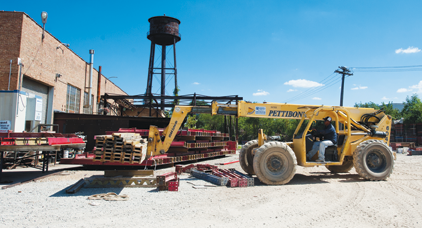 |
| Custom-made forms are stacked for delivery. CCS' sister company refurbishes and sells or rents forms, as well as manufacturing new forms. |
Trash chutes, both rental and sales, are a good example of how the company follows its nose in order to grow. “Anything taller than three stories usually uses a trash chute,” Pakus says. The company considered the opportunity and now sells trash chutes across the country, but they’re a consistently rented product around CCS’ home territory. “It’s been very good and over the past couple of years, that business has doubled for us each year.”
Respected expertise
Harris and two of the other managers in the forming division started their work lives doing high rise construction before becoming involved with CCS and what is now SureBuilT. Each has more than 40 years of experience in concrete construction. They spend more time on mid-rise, high-rise and bridge projects, they explain, while Pakus is multi-disciplinary for construction, with deeper knowledge of all commercial and some residential construction.
Expertise, it seems, runs throughout the organization, helping them get and keep customers. It’s reflected in the management team, but also in the sales team.
The company has 15 sales people throughout the greater Chicago area, calling on accounts in southern Wisconsin and northern Illinois. They travel beyond that - working with Walsh Construction on a bridge project over the Ohio River in Kentucky, for example – but their core is around Chicago. All 15 sales people, and Pakus, are constantly on the road, calling on customers and seeking new ones.
“What we try to instill in our guys is, when they walk into the trailer on a job site, they’re there to provide real help to the contractor. It’s not to talk about the weather, it’s about what we can do to help them be more productive,” Harris says. “The
superintendent on a job doesn’t have time to talk about the weather. They’re all under pressure to get the job done. We teach our sales people to read drawings, to have a little more knowledge, to be hands on” with the various needs around a
construction site.
The sales team is responsible for customer development, both rental and sales, of equipment, forms and supplies. Pakus says they’re tasked with getting to know every contractor and every subcontractor on any viable job site in their territory. They’re on the road almost every day and he even recommends they take different routes home or to customers’ job sites. “I think it’s amazing what you find when you take a different route – job sites you never knew existed,” he says. Pakus, too, is on the road finding new customers – usually 12 to 15 each year. This puts him on more job sites and also helps him guide the other sales people to build their customer relationships.
All of the company’s sales people have been involved in the industry for 10 years or more, and are trained in all aspects of the business, “although certainly we have some with more expertise in one or two areas, such as forming rentals,” Pakus says. “Everyone who does rental is also selling supplies to their customers. So, we’ll sell the ties, everything that goes with forming, for our concrete guys. As far as general contractors, we sell screws, guns, power tools all the way up” to rental and sales of skid steers and compact equipment.
Each sales person has had training on operating the equipment and the specs of the equipment. “They know what the equipment is capable of doing so they can make the right recommendations to customers,” Pakus says.
Paid on commission, he likes to have his sales team “hungry” but that doesn’t mean operating solo. They call on other sales people for input and guidance to meet a customer’s needs, and if more assistance or knowledge is required, they can call on Pakus or Harris to provide it.
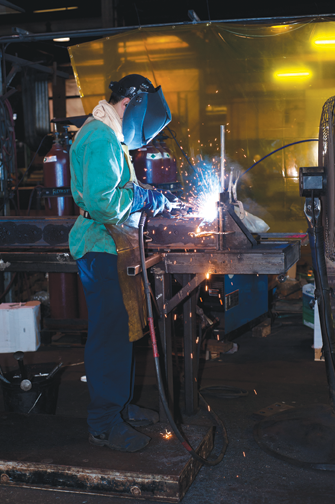 |
|
Rebar is custom cut for one of the company's high-rise concrete construction customers. |
“We joke that we give away a lot of free advice,” Pakus says. “But Larry, with his background and knowledge, can advise contractors on just about any job site. We have a lot of contractors that come to him for information. He often provides advice on how to best do a pour.”
“It’s just because of my gray hair,” Harris laughs, then adds, “but a lot of times you’ll do that – you provide them with advice and knowledge, ‘Here’s what you should do’ and then you move on. Down the road, you hope they remember that you helped them and they pay you back for it.”
Which is usually how it works. “It’s all about building relationships and knowledge. When you help a guy out on a job site, when you give them information on a project or on a major rental need, such as ground thawing equipment, that ends up saving them time, saving them money, helping them get the job done better, you have a friend for life,” Pakus emphasizes.
Building the one-stop shop
Expertise, combined with a diverse product line, is what helps them continue to earn new customers, Harris says. “When a guy comes in the door at CCS, if he wants a skid steer, if he wants a generator, if he wants a light tower, anything like that, he can get it. He can rent his forms here, he can get his forms engineered and then the rebar for inside the forms. It’s a one-stop shop for contractors.”
With the Chicago area commercial construction market on an uptick, they’re seeing equipment rentals and supply sales, and concrete form rental and sales, improving. The residential market, once the big business-driving force for the Naperville location, is picking up some steam, but still rather tepid. “We used to do just phenomenal business with residential contractors. We focus more on commercial now, but you have to change with the times. So that’s what we do,” Pakus explains.
Walking around through the store and warehouse and around the rental yard at the Naperville location, you’ll see compact excavators and wheel loaders from Wacker, Pettibone forklifts, Wacker generators and light towers, a range of pumps, Case and Bobcat skid steers, Ditch-Witch trenchers, Ditch-Witch and Toro compact utility loaders, a wide range of attachments, ride-on trowels and a lot of related concrete equipment.
“We typically like to have a couple brands of equipment available in many of our lines because, well, it’s like a Ford or a Chevy, some contractors have a preference,” Pakus explains. “Some prefer the ‘touch’ they get from one versus the other. We also like to keep various sizes available to help make sure we can match the right equipment to the contractor’s needs.”
That mix is fairly typical for a contractor rental center – but keep looking. What strikes you is what you see and what you don’t see. You won’t see heavy earthmoving equipment; heavy excavation and road-building is not an area on which they focus.
And you won’t see scissor lifts or aerial work platforms. While a growth market for other rental centers, CCS opted not to chase that business. “We did handle some (scissor lifts),” Pakus explains, “but it’s a very price competitive business. For us, from a profitable utilization standpoint, it wasn’t something we wanted to stick with.”
Instead, you’ll be looking at a sea of climate control products – dehumidifiers, HEPA air filtering systems, air movers and heaters for ground thawing. “We’re the largest in Illinois, maybe the Midwest, for ground thawing equipment rentals,” Pakus says. “We have almost 300 units. We have natural gas, propane and diesel. We go all over the country to get trained in using this equipment under different scenarios.”
And with this equipment comes the range of supplies required for making sure it is effective on the job site. Tarps, reinforced poly and concrete curing blankets often head out the door with the rentals. Complex requirements leads to increased rentals. Making the right recommendations requires a much more involved process with the customer, using specialty equipment not found in most rental centers. This gives CCS a competitive advantage in the market, and reflects the company’s focus on being able to provide expertise and guidance to customers.
“A contractor might tell us he needs three units, so we make sure we understand his game plan. Then, we try to figure out what is most economical for him. He might need one or two if we can show him how to best use the equipment. That type of product support goes a long way. If a guy finds out that ‘Hey, they just saved me $15,000 in rental and fuel costs,’ he’s going to continue to be your customer,” Pakus says.
Understanding the customers’ applications, what they need to accomplish and time requirements, along with ambient temperature projections, fuel calculations for diesel, propane and natural gas, are required to ensure the customer
receives the most cost-effective equipment recommendations possible. “There are a lot of variables that we cover with the customer. Is the building enclosed? Will they be leaving half the building open all day when bringing in supplies? Cubic footage, the type of temperature rise they should have for the project, several things that come into play,” he adds. “Maybe the contractor was looking for diesel, but we find out that he has natural gas available, we can run the comparison and make a recommendation. Or they might be looking for one machine to cure and one machine to thaw. Showing him how renting one of our machines, but splitting the heat to do both simultaneously, goes a long way” in helping secure long-term business relationships.
Ground thawing in particular, but climate control overall, grew about 20% in 2013 over the previous year, and is on track to beat that number this year. While the bulk of it is seasonal, he also is seeing between 20 percent and 30 percent growth each summer, much of it related to drying out storm or flood damaged structures to prevent mold growth and speed restoration efforts.
He says the Dryair system they rent is particularly useful, though it seems counterintuitive for summer use “because it really warms a space up with hot, dry air. But it will lower fuel costs – by about 50 percent – with no moisture, no humidity, no noxious fumes introduced,” drying out a space quickly, an advantage for restoration efforts.
Those advantages transfer to curing concrete, too, he adds. “We’ll get phone calls from contractors who need to dry concrete down to a certain moisture percentage so they can put down their VCTs or underlayment. Dehumidifiers won’t work as quickly as this system. They find they can get on to the next step of the project faster.”
Climate control systems are a point of difference for the company. Though a more complex rental that requires more sales expertise, it has been a growth area for CCS because it enhances productivity in winter and in summer on select projects.
“We also look at it, though, as a key step in diversifying and trying to balance winter versus summer demands for what we offer. We get very good utilization rates on concrete equipment and our skid steers, and on compressors. But even light towers tend to sit stagnant during the summer months.
“The upward swing of what we do – our focus – is to be so diversified (that) we continue to get more business coming our way. If a guy found he could only rent something at one place and get supplies someplace else but they prefer one supplier, then we’re the answer. We do a lot of business with contractors who are looking for that type of efficiency and service,” Pakus says.
Steady path to future growth
For next steps, the company will consider new locations and hopes to see ongoing expansion that will spur more growth for manufacturing as well as supply and rental. In their opinion, 2010 “was still a mess. Around 2011 it started moving a little bit. Right now, business is back to the same as it was in 2004, 2005,” for the concrete work, Harris says, adding that they’re challenged, in a good way, to keep up with the form work now. “We’re buying forms back from our customers, refurbishing them and then putting them out for rent,” Pakus explains. This reflects the company’s measured approach. As they see the market gaining more traction, SureBuilT Manufacturing will also expand.
The same holds for rental and supply expansion. “We closed a couple of locations during the downturn, as did most contractor rental and supply businesses. We’re taking our time, we want to make sure we continue to grow, and we have an eye on potential locations that we think will be growth areas in the future and where we will fit,” Pakus says.
Which is analogous to what the company’s customers do: They have a well-designed plan, have a solid foundation, and are making sure all of the key elements are solidly in place. When the timing is right, they’ll move quickly to expand on what they’ve already built.




